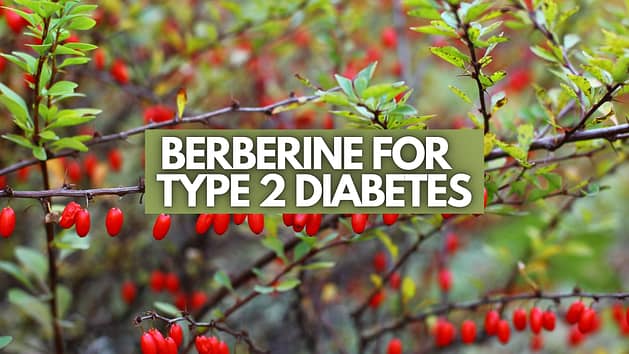I share the 5 best supplements for type 2 diabetes, review the scientific literature, share the recommended doses as described in research studies, and explain the benefits of each diabetic supplement. There are many more useful diabetic supplements, however, I share the best herbs and supplements for diabetes that are proven to work. You don’t need to take all of them. You can try one or 2 that you are interested in, with the supervision of your doctor.
Like always, keep in mind that supplements alone can’t reverse or put Type 2 diabetes into remission, and you need to follow a whole-body healing approach, that requires a long-term lifestyle change. To reverse or put your type 2 diabetes into remission, you should reduce your carbohydrate intake, manage your stress, sleep enough, increase your physical activity (daily walking is fine), and take some of these supplements for type 2 diabetes. Read my other blog post about the best diet for type 2 diabetes.
Table of Contents
5 Best Supplements for Type 2 DIABETES include:
- Berberine
- Alpha Lipoic Acid
- Vitamin B1 (fat-soluble)
- Matcha green tea
- Cinnamon
Where To Order These 5 Best Diabetes Supplements?
The Best Diabetes Supplements – Berberine.

Best Supplements for Diabetes. Berberine For Type 2 Diabetes.
Berberine is a natural plant compound found in several different plants, including Barberry, Oregon Grape and Goldenseal. It has been used in traditional Chinese and Indian medicine for thousands of years. Berberine has been shown to have similar effects to those of metformin.
So how does berberine work? Are there any studies to prove that it is effective at lowering blood glucose? Let’s look at this study: Efficacy of Berberine in Patients with Type 2 Diabetes.
Berberine has been shown to regulate glucose and lipid metabolism in vitro (which we can call test-tube experiments”, and in vivo, meaning it is tested on whole, living organisms or cells, usually animals or humans. This study aimed to determine the effectiveness and safety of berberine in the treatment of type 2 diabetic patients.
There was study A and study B. In study A, 36 adults with newly diagnosed type 2 diabetes were randomly assigned to treatment with berberine or metformin in a 3-month trial. The blood sugar lowering effect of berberine was similar to that of metformin. Berberine significantly decreased haemoglobin A1c, which is your average level of blood sugar over the past 2 to 3 months, from 9.5% to 7.5%.
It decreased fasting blood glucose from 10.6mmol/L to 6.9 mmol. It also decreased postprandial blood glucose, postprandial means after a meal, it went from 19.8 to 11.1 mmol/L. It also decreased plasma triglycerides from 1.13 to 0.89 mmol/L.
And there was another study. Study B. Where 48 adults with poorly controlled type 2 diabetes were supplemented with berberine in a 3-month trial. Berberine acted by lowering fasting blood glucose and postprandial blood glucose from one week to the end of the trial. Haemoglobin A1c decreased from 8.1% to 7.3%.
And they also looked at other factors such as insulin resistance. Fasting plasma insulin and HOMA-IR were reduced by 28.1% and 44.7%. Meaning that berberine makes you less insulin resistant. And total cholesterol and LDL cholesterol were decreased significantly as well.
Were there any complications? During the trial, 34.5% of patients suffered from short-term gastrointestinal adverse effects. There was no associated liver or kidney damage. And their conclusion was: this study indicates that berberine is an effective blood sugar lowering supplement with beneficial effects on lipid metabolism.
And what dose of berberine did they use in this study? They took 500 mg of berberine three times daily at the beginning of each meal. And if people experienced heavy gastrointestinal side-effects, the dose of berberine was reduced to 300 mg three times daily. So this gives you an idea of how to use it. But of course, you have to consult with your doctor, to make sure you can safely incorporate berberine into your diabetes treatment.
The Best Diabetes Supplements – Alpha-Lipoic Acid.

Best Supplements for Diabetes. Alpha-lipoic Acid for Type 2 Diabetes.
What is Alpha Lipoic Acid? It’s a compound that your body produces naturally, it can also be found in various foods, such as organ meats, red meat, broccoli, Brussels sprouts tomatoes and spinach, or you can take Alpha Lipoic Acid supplement, to get higher, more effective doses of it. Alpha-lipoic acid, also called ALA, is a naturally-occurring compound that has shown promising antioxidant and anti-inflammatory effects in experimental and human studies.
It acts as a powerful antioxidant in the body, that has several bioactive functions, such as anti-oxidation, influencing the glucose level regulation and recycling other antioxidants, such as glutathione and vitamins C and E and reducing blood lipids. It has also been shown effective in reducing the symptoms of diabetic nephropathy, such as weakness, pain and numbness that’s caused by nerve damage as a result of chronically elevated blood sugar.
It is recommended to take 600mg x 3 times a day.
The Best Diabetes Supplements – Vitamin B1 (fat-soluble).

Best Supplements for Diabetes. Benfotiamine for Type 2 Diabetes.
Many people with diabetes are vitamin B1 deficient. And this can increase the risk of various diabetes complications, such as diabetic neuropathy and blood vessel damage. B1 or thiamine is a water-soluble vitamin and it is not the most effective in this form, as cell membranes are made up of fat, it has difficulty getting into the cells.
However, there’s another type of B1, called benfotiamine, which is this fat-soluble form of B1. As it is fat-soluble, it easily gets into the cells through those cell membranes that are made up of fat. There are some studies to support that this form of B1, called benfotiamine can help to prevent diabetic complications such as diabetic neuropathy.
There are also studies to support that diabetic patients who do have diabetic neuropathy can benefit from taking this supplement, as it helps to regenerate the damaged tissues faster and relieve the symptoms of neuropathy. There’s this study Benfotiamine in the treatment of diabetic polyneuropathy–a three-week randomized, controlled pilot study.
And their results showed that a statistically significant improvement in the neuropathy score was observed in the group given Benfotiamine when compared to the placebo group. People treated with benfotiamine reported decreased pain and improvement in their overall condition.
And It is recommended to take B1 (fat-soluble) capsules 4 times a day. Like always, you have to consult with your doctor first.
The Best Diabetes Supplements – Green Tea.

The Best Diabetes Supplements – Green Tea.
Then, next, we have Green Tea. Green tea contains powerful antioxidants. The main antioxidant in green tea is called EGCG. You can take it as a supplement or simply drink organic green tea, such as matcha green tea.
There was a Randomized controlled trial that looked at the effects of green tea consumption on insulin resistance and inflammation markers. This was a randomised controlled trial with 66 patients with either pre-diabetes or diabetes. The intervention group were asked to take the green tea extract for 2 months and the control group drank their regular tea.
In the intervention group, after taking the green tea supplement for 2 months, the body weight, BMI, systolic and diastolic blood pressures, blood glucose level, Haemoglobin A1c level, insulin level and HOMA index, were lower than before the study. However, there were no significant differences between the groups. Well, that’s probably because both groups consumed some polyphenols. Within the intervention group, changes in insulin level tended to be associated with changes in polyphenol intake. So, there are some benefits of taking green tea supplement or simply drinking green tea, so why not to?
The Best Diabetes Supplements – Cinnamon.

The Best Supplements for Diabetes. Cinnamon for Diabetes.
Cinnamon has been used in Chinese medicine for hundreds of years. Cinnamon is known for its blood sugar-lowering effects. A recent meta-analysis of 6 clinical trials involving cinnamon has included 435 people. The duration of the studies was ranging between 40 days to 4 months, and the dose of cinnamon was ranging from 1 g to 6 g per day. It was found that cinnamon reduced fasting blood glucose and Haemoglobin A1c in short-term studies.
And there are various other supplements, but this post was about the best supplements for type 2 diabetes. And one more thing, do you need to take multivitamins? Well, not really. You would be better off getting a large salad and a smoothie every single day. Multivitamins are made using synthetic vitamins that won’t do any good to you.
So, this was my list of the best supplements for diabetes. And like always, you don’t have to take all of them. You can choose one or two that you want to try out. And you have to discuss it with your doctor first.
The Best Diabetic Supplement References:
Berberine for type 2 diabetes https://www.ncbi.nlm.nih.gov/pmc/articles/PMC2410097/
Alpha-lipoic Acid for type 2 diabetes https://www.ncbi.nlm.nih.gov/pmc/articles/PMC7059057/
Benfotiamine for type 2 diabetes https://pubmed.ncbi.nlm.nih.gov/15726875/
Green tea for type 2 diabetes https://pubmed.ncbi.nlm.nih.gov/16392704/
Cinnamon for type 2 diabetes https://pubmed.ncbi.nlm.nih.gov/22579946/

